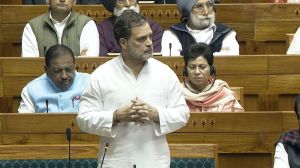Delhi HC sets aside cancellation of OCI registration, blacklisting of Kashmir-origin US national
The government had, however, submitted before the court that “these activities, remain classified as “secret for the security of India” and, for reasons of national security, cannot be disclosed to the Petitioner.”
 Section 7D of the Citizenship Act affords a right to be heard before cancellation of OCI status. (File Photo)
Section 7D of the Citizenship Act affords a right to be heard before cancellation of OCI status. (File Photo)
Setting aside the cancellation of OCI registration as well as the blacklisting of a Kashmir-origin US national Tuesday, the Delhi High Court recorded that “striking a balance between individual rights and national security is essential”.
The court held that the right to be heard under the Citizenship Act for cancellation of an OCI card should also be extended to the blacklisting process. If such procedural safeguard is not read into the statute, the court said “the government could arbitrarily apply dual remedies, targeting the same actions on identical grounds through both a blacklisting order under Section 3 of the Foreigners Act and a cancellation order under Section 7D(e) of the Citizenship Act.”
Khalid Jahangir Qazi, a clinical professor of medicine at the University of Buffalo who migrated to the US in the 1970s, through his power of attorney holder Farida Siddiqi, had moved the Delhi HC, challenging the legality of two restrictive measures imposed upon him.
By way of an order on May 12, 2023, issued by the Consulate General of India, New York, his OCI card under the Citizenship Act, 1955, and the Citizenship Rules, 2009, was cancelled; a subsequent blacklisting order was issued by the Ministry of Home Affairs under the Foreigners Act, 1946, restraining his entry into India.
According to government authorities, the action was taken over his alleged involvement in activities deemed to be prejudicial to the interests of India and “anti-national”. Qazi only realised that he had been blacklisted from being permitted to enter India after he moved court and following a response filed by the authorities, where it was stated that he “had been blacklisted by the Bureau of Immigration due to alleged involvement in pro-Kashmiri separatist activities and anti-India propaganda”.
Setting aside the showcause notice by which Qazi was asked to show cause as to why his OCI card should not be cancelled, the court recorded that the notice made broad allegations that lacked the “specificity necessary to afford the Petitioner an adequate opportunity to be heard, thus, contravening the procedural safeguards explicitly embedded in the proviso to Section 7D of the Citizenship Act”.
Section 7D of the Citizenship Act affords a right to be heard before cancellation of OCI status.
The court also held that “where grounds for blacklisting an OCI cardholder mirror those for cancellation under Section 7D of the Citizenship Act, the procedural safeguards under Section 7D should be extended to the blacklisting process”.
The Union of India had contended that the decision to cancel Qazi’s OCI card was made following “a detailed assessment of his actions, informed by reports and intelligence inputs from security agencies of the Ministry of External Affairs, which suggest that the Petitioner has engaged in activities inimical to India’s sovereignty and integrity.”
The government had, however, submitted before the court that “these activities, remain classified as “secret for the security of India” and, for reasons of national security, cannot be disclosed to the Petitioner.”
Justice Sanjeev Narula held that OCI cardholders will be subject to the regulatory framework of the Foreigners Act. Noting that OCI cardholders “form a distinct class under the Citizenship Act, 1955, recognised through specific amendments”, the court also held that the government is required to provide clear reasons for the proposal of cancellation of OCI card “so that the OCI cardholder can respond meaningfully, safeguarding the procedural fairness that natural justice principles intend to protect.”
“… for any cancellation order to withstand judicial scrutiny, it must not only be grounded in specific, reasonable grounds but must also reflect a process that meets both substantive and procedural reasonableness… an order to cancel OCI registration must transparently reflect both the grounds for cancellation and a fair decision-making process,” the court recorded.
“… while the Foreigners Act applies to OCI cardholders, the Citizenship Act confers on them a unique status with distinct rights and procedural protections… This means even when invoking Section 3 of the Foreigners Act, the government should observe procedural fairness by allowing the OCI cardholder an opportunity to respond when the grounds for blacklisting are one of the grounds mentioned under Section 7D… If this safeguard is not applied, we would run the risk of undermining the very purpose of the OCI scheme, as it would enable authorities to bypass specific protections and privileges granted to OCI cardholders by indiscriminately invoking the Foreigners Act. Such an approach would (be in) conflict with the doctrine of non-retrogression — principle of progressive realisation of rights and discouraging any regressive measures that undermine established rights — effectively weakening the OCI framework by treating cardholders as ordinary foreigners.”
“Allowing the state to circumvent the safeguards embedded in the OCI scheme would erode the privileges the Legislature intended for OCI cardholders, undermining both the purpose and object of the status of OCI cardholders under the Citizenship Act, 1955, and rendering their protections redundant. The result would be that an OCI cardholder, though technically retaining their registration, would effectively be prevented from exercising the rights afforded by that status. The long-term visa rights conferred under the OCI scheme would, in effect, be nullified without due process, denying the cardholder of the intended benefits,” the court held.
For Qazi, the court directed the authorities to issue a fresh notice that clearly specifies the grounds for any intended restrictions or cancellations before allowing him entry to India.
Such a notice shall provide Qazi with “sufficient details to understand the basis of the proposed action and to respond accordingly,” giving him a reasonable opportunity to submit a reply within a specified timeframe, “after which the government must carefully consider this representation and issue a reasoned decision, under both the statutes, which shall be conveyed to the Petitioner.” The court added that such a process should be completed within six weeks.







